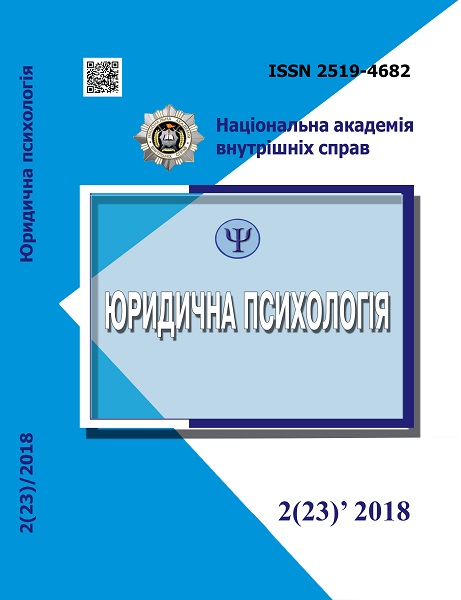Psychological Aid to Persons in a State of Traumatic Crisis
Abstract
Taking into account the difficult conditions in which the Ukrainian people live today, in particular – the military actions in the East of Ukraine, a difficult political and economic situation in the country, the issue of prevention and overcoming of crisis states, in particular those caused by traumatic events, are becoming of the greatest relevance for our citizens. The purpose of this theoretical study is to analyze the methods of individual and group aid to persons in a state of traumatic crisis. The article defines the concept of crisis as an acute emotional state that occurs at blocking of purposeful human life activities. At the same time, it is noted that crises can be normative (the ones which are a normal reaction to events that go beyond the norm) and excessive. In accordance with the most common classification, crises are divided into age-related and traumatic. The dynamics of the crisis is disclosed in the article. It is established that the development of a crisis depends on the circumstances and individual personal characteristics and there may be situations where it is not possible to find a constructive way out of the crisis without the involvement of a qualified psychological aid. The article deals with the causes and typical signs of a crisis, as well as complications of its course, the most common of which is post-traumatic stress disorder (PTSD), which occurs as a delayed or prolonged response to a stressful event (short-term or long-term) of an extremely threatening or catastrophic character, which can cause a deep stress in almost any person. The main symptoms and diagnostic criteria of PTSD severity are determined. It is established that the qualified psychological assistance provided in due time contributes to the prevention of psychogenic disorders and psychosomatic diseases of an individual. The principles of psychological aid to a person in a state of crisis are defined, as well as the aims of psychotherapeutic work with clients. Such methods of psychological aid as debriefing (a method of emergency group psychological aid); methods that are used in the remote stages of work with a mental trauma: the eye movement desensitization and reprocessing method (EMDR), the method of art therapy, especially the use of metaphorical associative cards (СОРЕ deck) in counseling are analyzed. Taking into account the negative consequences of the traumatic crisis, which affect the process of socialization of an individual and their health; the inability to overcome the traumatic crisis without involvement of additional resources (the latter includes group and individual psychological aid), the need to develop new forms and methods of working with clients who are in crisis, the emphasis is placed on the need for further research in this direction.
Downloads
Abstract views: 534 PDF Downloads: 2330
- Authors reserve the right to authorship of their own work and transfer to the magazine the right of the first publication of this work under the terms of the Creative Commons Attribution License, which allows other persons to freely distribute published work with mandatory reference to authors of the original work and the first publication of an article in this magazine.
- Authors have the right to enter into separate additional agreements on non-exclusive dissemination of the work in the form in which it was published in the journal (for example, to post an article in the institution's repository or to publish as part of a monograph), provided that the link to the first publication of the work in this journal is maintained.
- The journal's policy allows and encourages the posting of articles by authors on the Internet (for example, in electronic storehouses of institutions or on personal websites), both before the submission of this manuscript to the editorial office and during its editorial processing, as this contributes to the creation of a productive scientific discussion and positively affects the efficiency and dynamics of citing the published work.




